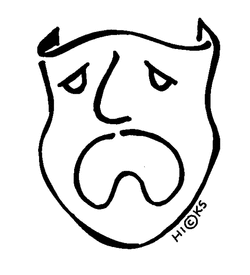
Oedipus the King is a story that explores tragedy in a very interesting way. It takes a man, a king, Oedipus, and his perfect life and strips it away almost instantaneously. As the king of Thebes, Oedipus had a wife, kids, servants, friendly brother in laws, and a palace, however, plague had struck his citizens. Being a righteous man, he attempts to help his people in any way he can. In his search for the salvation of his people, he unearths truths about himself that had been foretold by a prophecy many years prior. The story follows a relatively traditional tragic model. The main character, a hero, is on top of the world, leading his kingdom, and being successful and then it is all stripped away. The hero falls hard. It is an incredibly sad story, however, to connect it to my first blog post, it does produce that "paradoxical" positive reaction among its readers. Oedipus, while being incredibly weird and sad, is very entertaining book. It is simply interesting. The reader empathizes with Oedipus as he is going through his tragedy.

Today, we watched a Ted talk in class dealing with tragedy. The speaker presented some pretty interesting ideas about tragedy. The speaker's most notable thought, in my opinion, was that tragedy is simply a better alternative to ridicule. Tragedy offers an increased level of sympathy. One might call someone who goes through similar events to Hamlet a loser, however no one would call Hamlet a loser, because his story is presented in a dramatic and tragic manner. It is a better way of presenting ridicule. The speaker was trying to illustrate that point of view, and the way material is presented is often critical in determining how an individual will interpret a situation. Hamlet is a tragedy in addition to being a story about some guy who goes crazy. I think this may not be a part of the definition of tragedy, and it may not be a reason that human's enjoy tragedy, but it certainly elaborates on what a tragic story is capable of doing. It is capable of generating sympathy.

Originating in obscure Greek theaters two thousand five hundred years ago. It is a form dramatic material that exploits human suffering for entertainment value. A rather paradoxical reaction is produced, that is audiences having positive reactions to the negative events they are witnessing. In the theater among other things, tragedy is the opposite of comedy, however elements of both may be present in a single work. Aristotle claimed that tragedy is effective because audiences find relief from their own lives through pity for the characters. In Greece, tragedies were written by Sophecles and Euripidies among many others, and in Europe, the most popular tragedies were written by William Shakespeare. Arthur Miller is perhaps the most iconic tragedy writer of the modern time period. Today the assignment was really designed to give us a dictionary definition of tragedy. We were to solidify in our minds what can be an abstract concept. The information that we found in our brief research can now be used as we explore the idea of tragedy in the future.



 RSS Feed
RSS Feed